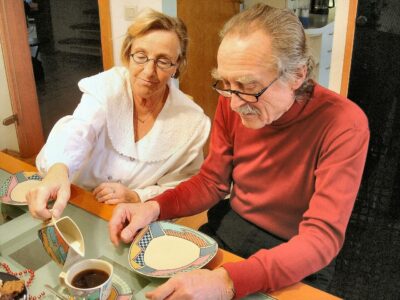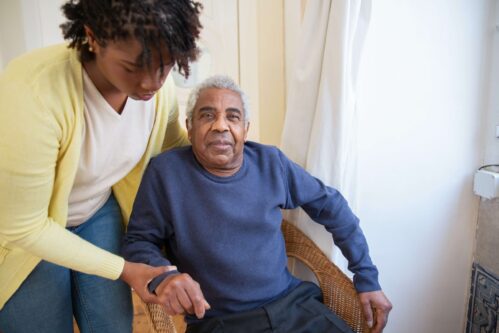When is it time to get Dementia caregiving help?
Living alongside Dementia, whether helping an independent elderly loved one or a dedicated caregiver in the home, is a unique journey filled with both challenges and moments of love. In this blog article, we’ll explore the signs that indicate the right time to seek Dementia caregiving help and the various options available. Whether your loved one is living independently or you are a caregiver providing around-the-clock support, you will need help at some point in time.
Meet Aunt Julia and Uncle Fred, a loving couple who had shared a lifetime of memories. For years, Uncle Fred had been Aunt Julia’s pillar of support, navigating the twists and turns of life together. Their journey took an unexpected turn when Uncle Fred began grappling with Dementia.
As Aunt Julia embraced the challenges of a loved one with Dementia, she noticed subtle shifts in her role as wife. The turning point in her life came when Uncle Fred, once meticulous about his personal care, could no longer remember how to bathe himself. It was a moment that hit Aunt Julia hard, a moment that signified the real impact of Dementia on their lives.
This was when she realized her role as caregiver was quickly replacing her role as his wife. Her life as she knew it would never be the same. She had already taken on all of her husband’s roles, such as managing the finances, the home, vehicles, etc.. Now, she had to add daily physical care to the growing list of things she had to do.
She had her own medical problems, and she simply couldn’t do this all on her own anymore.
She cried for days, and then she asked for help.

When to Seek Dementia Caregiving Help for an Elderly loved one with Early Dementia Living Alone
Dementia can bring about subtle yet impactful changes in an individual’s daily life. Recognizing these signs early on is crucial for providing the necessary support. Let’s delve into the changes in independent daily living to help you navigate this aspect of the dementia journey.
When you have a loved one with early Dementia who is still living independently, you need to pay attention to the small things. Most older adults are terrified of losing their independence, so they try to hide any symptoms of Dementia from their family and friends.
Knowing what to look for is the first step in recognizing when they need help.
Observing Changes in Daily Living:
Signs to Watch For:
Increased forgetfulness impacting daily routines.
Challenges in managing finances, medications, or essential tasks.
Evaluation:
Monitor changes in the ability to complete familiar tasks.
Assess the impact of forgetfulness on daily life and overall well-being.
Right Time to Seek Support:
When forgetfulness significantly hinders their ability to maintain a safe and comfortable daily routine.
Assessing Emotional and Behavioral Shifts:
Signs to Watch For:
Withdrawal from social activities and hobbies.
Mood swings, anxiety, or unexplained changes in behavior.
Evaluation:
Observe shifts in social engagement and emotional well-being.
Assess the impact of behavioral changes on the individual’s quality of life.
Right Time to Seek Support:
When emotional and behavioral changes affect the individual’s ability to maintain a sense of joy, purpose, and connectedness.
Addressing Safety Concerns:
Signs to Watch For:
Wandering or getting lost.
Increased risk of accidents and falls.
Evaluation:
Conduct a home safety assessment to identify potential hazards. You can find the Home Safety Checklist HERE.
Monitor changes in the individual’s ability to navigate their environment safely.
Right Time to Seek Support:
When safety concerns pose a significant risk to the individual’s well-being, indicating the need for additional supervision or modifications in the home.
Navigating Communication Difficulties:
Signs to Watch For:
Difficulty expressing needs or emotions.
Confusion in conversations and challenges in understanding.
Evaluation:
Observe changes in communication patterns and effectiveness.
Assess the impact of communication difficulties on the individuals’ ability to convey their needs.
Right Time to Seek Support:
When communication challenges hinder the individual’s ability to express themselves and engage meaningfully with others.
By being attuned to these indicators, caregivers can ensure timely introduction of support. Simply adding assistance in their home, you are helping your loved one maintain their independence as long as possible. Many areas have programs to provide helpers to seniors living alone (more on that below).

When to Seek Additional Dementia Caregiving Help at Home for the Caregiver: A Guide for In-Home Caregivers
Caring for a loved one with Dementia is a commendable but demanding role, and in-home caregivers often face challenges that impact their own well-being. Recognizing the signs of depression, caregiver burnout, and physical ailments is crucial for ensuring that caregivers receive the support they need. Here’s a guide tailored to in-home caregivers on when to seek help.
Signs of Depression:
Signs to Watch For in the Caregiver:
Persistent feelings of sadness or hopelessness.
Changes in appetite or sleep patterns.
Loss of interest in activities once enjoyed.
Difficulty concentrating or making decisions.
Fatigue and low energy levels.
Recognition:
When these signs persist for an extended period, affecting the caregiver’s ability to cope with daily challenges.
Action:
Lighten the caregiver’s load by getting help to come in. Seeking help from a mental health professional, such as a therapist or counselor, can provide emotional support and coping strategies. Connecting with support groups or friends who understand the caregiving journey is also beneficial. Learn more about Dementia Caregiver Support HERE.
Caregiver Burnout:
Signs to Watch For in the Caregiver:
Constant feelings of exhaustion and fatigue.
Increased irritability or feelings of resentment.
Withdrawal from social activities and hobbies.
Neglecting personal health and self-care.
Decreased sense of accomplishment or fulfillment.
Recognition:
When these signs persist, impacting the caregiver’s ability to provide effective care and maintain a healthy balance.
Action:
Prioritizing self-care becomes essential. This may include seeking respite care to take short breaks, delegating tasks to family members or friends, and finding moments for personal relaxation and enjoyment.
Learn more about Caregiver Burnout HERE.
Physical Ailments:
Signs to Watch For in the Caregiver:
Persistent aches, pains, or headaches.
Weakened immune system, leading to frequent illnesses.
Sleep disturbances affecting the quality and duration of rest.
Changes in weight due to altered eating patterns.
Recognition:
When physical symptoms impact the caregiver’s ability to perform caregiving tasks and maintain their own health.
Action:
Seeking medical attention to address physical ailments is crucial. Regular check-ups, proper nutrition, and engaging in moderate physical activity can contribute to the caregiver’s overall well-being.
Persistent Stress and Anxiety:
Signs to Watch For:
Constant worry and anxiety about the future.
Difficulty relaxing or unwinding, even during breaks.
Heightened levels of stress affecting mental and emotional well-being.
Recognition:
When persistent stress and anxiety become overwhelming, hindering the caregiver’s ability to provide compassionate care.
Action:
Exploring stress-management techniques, such as deep breathing exercises, mindfulness, or yoga, can help in managing anxiety. Additionally, seeking counseling or support from healthcare professionals can provide effective coping strategies.
In-home caregivers play a vital role in the well-being of their loved ones with Dementia, and it’s equally crucial for them to prioritize their own health. Recognizing these signs and taking proactive steps to seek help ensures that caregivers can continue providing the best possible care while maintaining their own physical and emotional well-being.
Types of Dementia Caregiving Help Available
Caring for a loved one with Dementia often involves accessing various types of support to ensure a holistic and well-rounded approach to caregiving. Let’s explore two key types of caregiving help available, focusing on in-home care services.
Professional Caregivers: Bringing Expertise Home
Role of Professional Caregivers:
Professional caregivers are trained individuals who provide in-home assistance to individuals with Dementia. They play a crucial role in supporting daily activities, ensuring safety, and offering companionship.
Examples of Assistance:
- Personal Care: Professional caregivers assist with activities like bathing, dressing, and grooming, ensuring that the individual with Dementia maintains personal hygiene and dignity.
- Medication Management: They help with organizing and administering medications, ensuring that the individual follows the prescribed treatment plan.
- Meal Preparation: Caregivers can plan and prepare nutritious meals tailored to the dietary needs of the person with Dementia, addressing any challenges related to eating.
- Companionship: Beyond practical tasks, professional caregivers provide companionship, engaging in conversations, activities, and providing emotional support.
Benefits:
- Familiar Environment: Care is delivered in the comfort of the individual’s home, promoting a familiar and secure environment.
- Customized Care: Professional caregivers can tailor their assistance based on the specific needs and preferences of the person with Dementia.
- Respite for Family Caregivers: In-home caregivers offer family caregivers much-needed respite, allowing them to recharge while ensuring continuous care for their loved one.
Home Health Services: Tailored Care in Familiar Surroundings
Role of Home Health Services:
Home health services extend beyond basic caregiving to include medical and therapeutic interventions. These services are often provided by a team of healthcare professionals.
Examples of Medical Assistance (skilled care):
- Nursing Care: Registered nurses can administer medications, monitor vital signs, and provide specialized care for health conditions associated with Dementia.
- Physical Therapy: Home health services may include physical therapy to address mobility challenges, improve balance, and enhance overall physical well-being.
- Occupational Therapy: Therapists can help individuals with Dementia maintain independence in daily activities, adapt their environment, and enhance cognitive functioning.
- Speech Therapy: For individuals experiencing communication difficulties, speech therapists can provide strategies and exercises to improve verbal and non-verbal communication.
Benefits:
- Holistic Approach: Home health services offer a comprehensive approach by integrating medical, therapeutic, and caregiving support.
- Individualized Care Plans: Healthcare professionals develop personalized care plans based on the specific needs and health status of the person with Dementia.
- Continuity of Care: Coordinated care ensures seamless communication between different healthcare professionals, promoting continuity in the care provided.
Examples of Non-Medical Assistance:
Personal Care Services:
These caregiver assistants can help provide bathing, dressing, toileting, eating, exercising, or personal care. In nursing, we refer to these as activities of daily living (ADLs). These are usually certified nurse assistants (CNAs) or healthcare technicians (HCTs). Their titles may vary a little in different states. They have had training in providing personal care.
It often becomes too difficult to assist your loved one with Dementia during bathing. This is often when caregivers reach out for outside help to come into the home

Homemakers:
These are people who can help with the cooking, cleaning, laundry, or shopping. They usually do not have any special training and often do not provide personal care such as bathing.
They can help with many household chores. They can also run errands and assist with transportation to appointments. Meal planning, getting groceries, and cooking are some of the services many caregivers appreciate help with.

Understanding the types of Dementia caregiving help available allows family caregivers to make informed decisions about the best combination of services for their loved one with Dementia. These support options contribute to a more comprehensive and effective caregiving approach, whether through professional caregivers providing day-to-day assistance or home health services offering specialized care.
Where do I find these Dementia Caregiver helpers?
Reach out to your doctor, his office staff should be able to point you in the right direction. Call your health department, in my county they are the starting point. They have a list of all the resources available in the area.
https://www.communityresourcefinder.org/ is also a good place to start.
I highly recommend using an agency or someone referred to you personally. When you are calling about Alzheimer’s help in the home, there are several questions you should ask.
- What type of background screening do they do?
- Do they have dementia training?
- Who is responsible for paying the helper, you or the agency?
- What hours their helpers are available?
- Who do you call if they don’t show up?
- Are their services covered by Medicare or Medicaid?
- Can you get the same worker to care for your loved one each week?
- Can you meet the helper before you sign on?

What if I can’t afford dementia caregiving help at home?
Help in the home can be expensive. Especially in the late stage of Dementia when you may need help around the clock.
Medicare, Medicaid, VA, or other state and federal programs provide and fund different programs. Find out what is available in your area. These programs usually cover 4-20 hours of weekly homemaker or personal care help.
Medicaid has consumer-directed care programs, often allowing recipients to hire relatives as paid caregivers. Adult children can commonly be hired and paid to care for their aging parents. Several states even allow one’s spouse to be hired. See the list of state information HERE.
Since it varies significantly from state to state, I recommend you start with your local office on aging. More information can also be found at these sites:

Your journey is a very difficult one, but you don’t have to do this alone!
During the early stages of Dementia, you may not need much help, but at some point, you will not be able to continue doing this alone. You will wear down.
You will both benefit from weekly help in the home, whether it is family member sitting while you go for a walk in the park or someone to come in and give a bath a couple of times a week.
You can walk down a dark, lonely path alone or one with assistants along the way to help you. But you are going to have to find them, and the sooner you start the process, the better for both of you.
Please learn what help is available and reach out for help.
Utilizing Apps for Dementia Caregiver Support
In the realm of caregiving, ALZlog emerges not just as an app but as a compassionate companion, supporting in-home caregivers in their daily challenges. Here’s how ALZlog becomes an invaluable guide for both caregivers and the additional help they may bring in:
1. Streamlining Care Documentation:
- Digital Care Logs: ALZlog’s intuitive interface allows caregivers to effortlessly document and track the care provided. From medication schedules to daily activities, caregivers can create detailed logs that serve as a comprehensive record of the care journey.
2. Facilitating Communication:
- Real-Time Updates: ALZlog becomes a central hub for communication between caregivers. When additional help, such as a caregiver assistant, is involved, the app ensures seamless communication, enabling the exchange of real-time updates, concerns, and progress.
3. Educational Resources:
- Guiding Caregiver Helpers: ALZlog serves as an educational resource not only for primary caregivers but also for those offering assistance. It provides guidance on dementia care practices, ensuring that caregiver helpers are well-informed and equipped to deliver quality care.
4. Community Connection:
- Caregiver Support Network: ALZlog’s Caregiver Notebook extends beyond individual caregiving experiences, fostering a community where caregivers and their helpers can connect. It becomes a space for sharing insights, seeking advice, and finding solidarity in the caregiving journey.
5. Documentation for Family Insight:
- Shareable Reports: ALZlog allows caregivers to generate shareable reports summarizing the care provided. This feature ensures that family members, no matter where they are, can stay informed about their loved one’s well-being, fostering transparency and collaboration.
Experience ALZlog – Your Trusted Care Companion
ALZlog’s Caregiver Notebook transcends the role of a mere app; it becomes a reliable ally in the caregiving process. From aiding caregivers in documentation to guiding caregiver helpers, ALZlog is committed to enhancing the overall caregiving experience.
Empower your caregiving journey with ALZlog.
Learn more about helping an elderly loved one with early dementia living alone HERE Learn more about providing better Dementia care to a loved one in your home HERE.

The Dementia Caregiver Blog Library
Activities, Advanced Directives, Agitation, Apathy, Approach, Apps for Caregivers, Basic Caregiving, Bathing, Bathroom Safety, Caregiver Burnout, Caregiver Compassion, Caregiver Emotions, Caregiver Help, Caregiver Loneliness, Caregiver Support, Cold & Flu Season, Communication Challenges, Dehydration, Dementia Complications, Dementia Doctors, Dementia Safety Home, Dementia Types, Dementia-Friendly, Dressing Issues, Driving Safety, Eating Problems, Fall Prevention, Family Help, Finances, Guns & Dementia, Harm Prevention, Healthcare, Help at Home, Hiding Dementia, Holidays, Hospice, Hospital Stay, In-Between Stage, Kitchen Safety, Laughter, Legal Healthcare, Marijuana use, Medication Tips, Music, Nutrition, Pain, Patience, Poop Problems, Relationships, Reminiscing, Routine, Safety, Sense of Purpose, Shadowing, Sleep Issues, Stages of Dementia, Sundowning, Television, Time Travel, Traveling, Toileting, Wandering
Exploring Caregiving Tools & Resources? Don't Forget to Check Out My Resource Page! 🌟

Hi, I’m Larea, a Certified Dementia Specialist and Registered Nurse with 30 years of hands-on experience helping dementia patients in various settings, from hospitals to nursing homes and hospice. Drawing on personal experiences with my family members and patients over the years, I’m here to help guide you on your caregiving journey.


